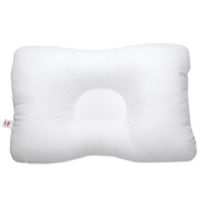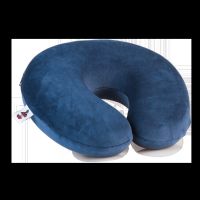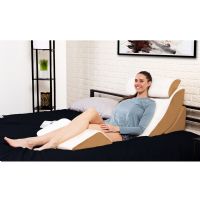 Written by Heather Collins, MSN, RN, CNOR
Written by Heather Collins, MSN, RN, CNOR
Consistently ranked as one of the top 5 disabling disorders in the United States, neck pain is not only uncomfortable but also interferes with our ability to participate in daily activities and enjoy life. The good news: Ongoing research continues to provide evidence that orthopedic neck pillows can help both prevent and treat neck pain. The bad news: Ongoing research also shows that too many of us choose the wrong kinds of pillows, which leads to even more neck pain and discomfort. If you’re interested in finding the best neck support pillow to meet your unique requirements, read on to learn what tips our product experts had to share.

If you’re experiencing neck pain, you have plenty of company - it’s estimated that 7 out of 10 people will be challenged by neck pain at some point in their lives. Choosing a good neck support pillow can make all the difference for anyone living with the most common causes of cervical discomfort, including muscle pain, muscle spasms, headaches, facet joint pain, nerve pain, referred pain, and bone pain. As a helpful support for poor posture, trauma from accidents or falls, and for pain caused by sleeping in an awkward position, a neck pillow for bed can provide helpful support and relief for a number of medical conditions, including cervical dystonia, meningitis, herniated disks, myofascial pain syndrome, rheumatoid and osteoarthritis, spinal stenosis, fibromyalgia, cervical spondylosis (disk degeneration), and much more. Talk to your doctor to determine if an orthopedic neck pillow could help you, too.
 | D-Core Cervical Pillow by Core Products View Product |
Specially designed to provide strong neck support, a cervical pillow has a curved rise for the neck and a flat, indented middle area (often shaped like a D) for the head, supporting people who sleep on their side or back. Helping to minimize neck pain and improve sleep quality, cervical pillows adapt to the individual user’s head, neck, and shoulder contours, optimizing comfort and proper positioning as they aid in the prevention of headaches, a stiff neck, and a frozen shoulder.
Recommended: D-Core Cervical Pillow by Core Products
| Jackson Core Roll Support Pillow by Core Products View Product |
Configured as a small cylindrical pillow shape, a neck roll pillow provides added support for your cervical spine when you lie on your back or on your side. Placed directly underneath the neck or inside a pillowcase with a regular pillow, a neck roll pillow supports the natural curve of the neck, keeping the head in line with the neck, and filling in the area between the head and shoulder. Whether it’s used alone or in conjunction with a regular pillow, a neck roll pillow should be long enough to support your neck, even if you roll to one side or the other.
Recommended: Jackson Core Roll Support Pillow by Core Products
 | AB Contour Vinyl Pillow by Core Products View Product |
Similar in design to cervical pillows, standard contour pillows come in various shapes to provide customized support for a variety of different medical conditions affecting the neck. Specifically configured to alleviate pressure points, contour pillows are generally constructed with some type of firm and non-collapsible foam core to keep the user’s head and neck in correct alignment. Typically best for back sleepers, contour pillows take the strain off the neck, delivering contoured, pain-relieving support that optimizes sleeping comfort.
Recommended: AB Contour Vinyl Pillow by Core Products
 | Memory Travel Core Pillow by Core Products View Product |
Ideal for neck support while traveling, horseshoe-shaped pillows also provide good cervical support for resting or sleeping while sitting up or reclining in a chair. Helping to keep the head from dropping to one side or the other, these U-shaped neck pillows also displace some of the head’s weight, optimizing comfort and reducing neck strain. Horseshoe-shaped pillows are particularly easy to transport, as they can be worn around the neck to ensure you always have neck support, wherever you roam.
Recommended: Memory Travel Core Pillow by Core Products
Available in a wide assortment of materials, neck pillows can be constructed with memory foam, feathers/down, polyfoam, gel, cotton, and more, while the cover options include wool, cotton, linen, silk, and satin. Hypoallergenic construction is ideal for anyone living with allergies. To determine which material construction is best for a potential user, it’s important to know how much support is required along with personal comfort needs. Memory foam and polyfoam conform to cradle the head and neck supportively but tend to retain too much heat for some users. Feathers and down optimize lightweight softness, but get compressed and lose their shape over time. Gel, cotton, and other natural and synthetic fibers are generally best for wicking away heat and sweat. Experts say that while the material choice certainly matters in selecting the best neck pillow for bed support, the most important aspect is ensuring that the pillow you choose feels comfortable to you..
As a crucial aspect in figuring out the best neck pillow for bed support, finding the right firmness and texture makes all the difference in whether the pillow will help your neck pain or make it worse. If it’s too soft, the pillow will sag underneath your head and fail to provide the proper neck support. If it’s too hard, it can cause painful pressure points. In order to find the best level of firmness to meet your unique needs, factors to consider include your usual sleeping position, the firmness level of your mattress, how heavy your head is, and the height of the pillow you require. Because you’ll be using the pillow every night, comfort is paramount - be sure to choose a firmer pillow if you require more support.
Because they’re designed for a wide range of user requirements, specialty neck pillows do not come in standard dimensions for each type. It’s important to review the dimensions of the various neck support pillows to ensure you find the right fit for your particular needs. Larger-than-average users with broad shoulders should typically choose larger neck pillows for the best support, while smaller-than-average users will be better served by smaller neck pillows. Horseshoe-shaped neck pillows are the best size for neck support while traveling.
Affecting the quality of the sleep you experience, your sleeping position also determines what type of neck support pillow is best for you. If you sleep on your back, standard contour pillows are generally best, providing support for the neck and head without propping it up too high. If you sleep on your side, a cervical pillow is typically your best option as it provides higher support underneath the neck than underneath the head. Keeping the cervical spine in an aligned, neutral position with the rest of the spine is always the goal, no matter what your sleeping position may be. Sleeping on the stomach is the worst position for people living with neck pain and should be avoided. Horseshoe-shaped neck pillows are recommended for sleeping while sitting up or traveling, while neck roll pillows add customizable support for both side and back sleepers.
Because they promote proper cervical alignment, investing in a good quality neck pillow for bed support is crucial to improving your overall health as well. Pricing for neck support pillows varies widely, ranging from $25 to $350, depending on the design and materials used. Keep in mind that some neck pillows may need to be replaced after a year or two as they lose their loft, support, or conforming abilities, while other designs will hold up for years of functional use. There are plenty of quality options ranging from inexpensive to premium to fit every budget and unique support need.
Also referred to as the loft, the height of the neck pillow must be considered to ensure it meets the support needs of its intended user. Sleep experts recommend selecting a pillow that keeps your head and neck aligned with your spine, as a pillow that’s too low or too high can force your neck to bend at an unnatural angle. Too much or too little elevation can also lead to sleep interruptions and breathing difficulties. A neck pillow for the bed should generally be shorter in height for back sleepers to prevent the head from jutting out too far, and taller in height for side sleepers, keeping the neck straight in line with the spine.
We recommend the Avana Kind Bed Orthopedic Support Pillow System for total support and comfort. People with neck pain often benefit from a pillow system that not only cradles and supports the head and neck but also provides adjustable, comfortable positioning support for the entire body. Keeping the spine at a correct angle to avoid pressure points and strain, we consider this 4-pillow positioning system from Avana Comfort the best pillow to support your neck for reading in bed - and just about everything else! Suitable for most sleeping positions and specifically crafted for customizable comfort, this unique system enables infinite configurations for adjustable support. Ergonomically conforming to the body’s natural angles and curves, the wide and curved headrest provides comfortable support for the head and neck whether you're sitting up or lying down.
 | Avana Kind Bed Orthopedic Support Pillow System View Product |
Yes! Neck pillows have been proven to help both treat and prevent neck pain, especially when combined with physical therapy and/or exercise. Available in a vast array of styles and price points, a neck support pillow can improve your posture, reduce pain, increase circulation to the head, enhance sleep quality, and relieve tense muscles. Helping to keep your spine in healthy alignment, a neck pillow for bed provides a great deal of comfort and support you can access every night!
Yes! The best neck support pillow for travel and sleeping on the go is the horseshoe or U-shape. Conveniently worn around the neck, this type of travel pillow prevents the head from bending or jolting to the side, while it also provides comfortable support and positioning for the head and neck.
While not all neck support pillows can be laundered in a washing machine, there are many that can, along with pillows that have removable, machine-washable covers. Other types may be constructed with antimicrobial agents to reduce the frequency of how often they need to be deep-cleaned. Before purchasing, always check the cleaning instructions from the manufacturer.
Several types of neck support pillows often help with obstructive sleep apnea (OSA) as the head and neck positioning support they provide promotes open airways. Wedge pillows are another type of neck support pillow that angle the upper body into a slightly elevated position. Helpful for sinus problems, snoring, and sleep apnea, wedge pillows are also helpful at reducing GERD (gastroesophageal reflux disease) and acid reflux. If you use CPAP therapy, it’s best to select a neck support pillow that won’t push the mask off when you sleep on your side - CPAP pillows are specially designed exactly for this purpose.
While some incidences of neck pain resolve naturally, for some people it can become a chronic condition that adversely affects their quality of life. Caused by a number of different factors that include poor postural habits of sitting at a computer for hours to chronic medical conditions like arthritis, neck pain is very common and will affect most of us at some point in our lives. As an essential part of a comprehensive treatment plan, using the right neck pillow for bed support can reduce this pain.
Enhancing sleep quality, spinal alignment, relaxation, and healthy posture, a neck support pillow is an ideal therapy for anyone affected by cervical pain. Thanks for taking this opportunity to learn more about orthopedic neck pillows and we invite you to check out more helpful articles at Caregiver University.

Heather Collins, MSN, RN, CNOR
Heather is a registered nurse and freelance health writer with a Master's degree and over 24 years of nursing and leadership experience. Heather cares for patients of all ages in various healthcare settings, including inpatient acute care nursing, GI procedural nursing, cardiac lab, infertility clinics, pediatrics, and surgical services. Heather is dedicated to providing high-quality care and sharing reliable, evidence-based information that empowers people to make informed decisions about their and their loved ones' health.